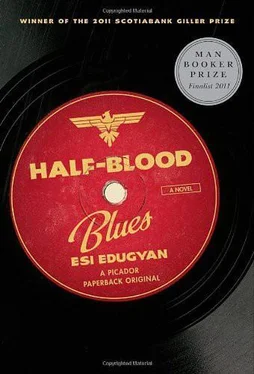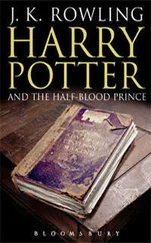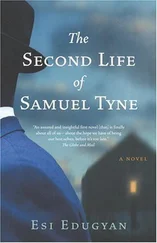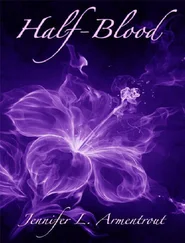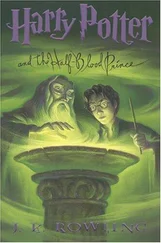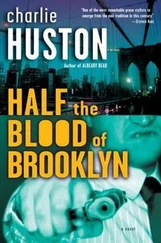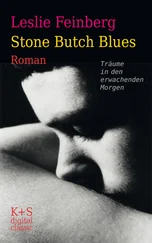‘Sid?’ he said.
I spat on the Bug’s filthy floorboards.
But then his expression, hell. I wanted to take back all of it. I ain’t never seen a jack look so crushed. You could see it in his face, something inside was wilting, a slow closing over. His eyes gone real dark.
‘Aw, I kiddin Hiero.’ I kicked out the chair across from me. ‘Come on, bring you ass on over here and split this drink.’
He just stood there a second more, looking at me with a hardened face.
‘Hiero,’ I called out angrily.
He just turn and walk on out of that shop and into the street, the door banging behind him.
The Bug watched me with a sour twist of her mouth, but she ain’t said nothing.
And so that dreamlike winter began.
Even awake I was sleeping. Dumped in a foreign city, where I ain’t known hardly a soul, the language a constant door in my face. It weighed on me, the loneliness, the jealousy. I took to avoiding Delilah when I could, leaving late or early, eating in strange cafés no gate like to turn up in. I blocked out the kid entire. I ain’t certain he even notice.
The streets of Paris turned white as mould under the cold blare of gas lamps.
The kid and Chip, they gone out at strange hours, the kid dragging Armstrong’s old horn with him as they went. I just turned over in my blankets, stared at the wall with dulled eyes in the darkness. I ain’t asked after the record. They ain’t said. Armstrong grown sick again, grown healthy. He vanished for a time to tour in some other country and then he was back and they was working again. That venom in my gut ain’t eased none.
What surprised me was how easily time begun to pass. A week gone by, then a second, a third. Christmas come and gone without celebration. I marked January by the vanishing of red bows, of tree-shaped sweets from patisserie windows.
It was a damn dark winter, made darker by nothing to do. I took to spending my afternoons walking all of Paris, my toes smarting from the cold, and in my head, over and over, the ugly beauty of Hiero’s horn.
……….
One other thing happened that dreamlike season.
It was noontime, the sky entirely white. I’d just stumbled across Pont de la Concorde, my hands shoved deep in my pockets, when I felt a shadow cross my path. I looked up, and there he was again. Louis goddamn Armstrong. Standing in front of me, holding a bag of groceries, his breath clouding the air.
I flushed.
‘Griffiths,’ he said in that rich crunching voice. ‘You goin this way?’
‘How the disc comin?’ I said.
‘Oh, slow. Real slow. We just feelin our way in the dark.’
I wasn’t sure what to say to that. We started walking over the snow.
Armstrong give me a sidelong look. ‘Delilah been worried bout you. You alright?’
‘She tell you that?’
He nodded.
‘We ain’t together no more,’ I said. ‘She tell you that, too?’
‘I heard.’
‘She ain’t even talkin to me. I come in a room, she go out of it. She tell you that too?’
Armstrong jostled his bag of groceries into the elbow of one arm, put a soft gloved hand on my back as we walked. ‘I know how it is, when it ends like that. I know how it hurt the heart.’
I was still half-cut from the gin that morning and I sort of swayed back, give him a funny look. ‘I ain’t got no heart,’ I said bitterly. ‘Ain’t that why I ain’t worth a damn on my axe?’
There was a old man sitting riverside, his pole drifting in the current. I reckoned it was too damn cold to catch anything. But there he was.
Armstrong’s voice got real gravelly, real deep and soft, like a pelt carpet. ‘There is a whole lot of talents, Sid. You a mighty fine rhythm boy.’
‘But I ain’t got the stuff.’
‘You know what you got. Ain’t no one tell you otherwise.’
I shook my head in disgust.
‘It don’t matter much bout all that anyway,’ Armstrong added. ‘You think it do, but it don’t. A man ain’t just his one talent. Little Louis needs you. And Jones look to you like you his brother. You got the talent of making others your kin, your blood. But music, well it’s different. I reckon it got its own worth. But it ain’t a man’s whole life.’
Aw, hell, Louis , I thought. Ain’t nothin else I want.
Something gone out of me, after that. Some of that fury I been feeling. The hurt just sort of evaporated off, and I felt lighter, sadder, but less alone. I ain’t saying we started being friendly again, not like that. But we circled each other, me, Chip and the kid, with a kind of restful grace. Every morning I watched them shuffle out to cut that record, and every night I seen them return home dog tired, and it seemed with each coming and going I began to feel less bitter. Like I finally understood we was in this life together.
Delilah, hell, I still couldn’t look at her without feeling brutally sick. But I wasn’t angry at anyone, not no more.
And the Phony War continued. One night in February I was ankling home when I seen the sky flash like a camera, then die again into stillness. The silence was frightening. In the morning Lilah translated from the paper that it been one of the Frogs’ own shells, crashing down across the river, in the Fifth, near the Censier station on Rue Mirbel. Punched a hole a foot and a half wide, wrecked a café. Two janes died. A jack got his leg cut right off. There ain’t even been a damn siren.
Then the restrictions begun. Bread was cut back, twists forbidden, only basic loaves and croissants permitted. Some days the butcher shops closed. Other days, no candy. What gnawed at us, though, was Tuesdays, Thursdays, Saturdays, days when the liquor was corked up, and a jack couldn’t find a hard shout to drink for all the damn francs in the city.
But even that ain’t woke us up. We just brought our own rot when we gone out, toting the bottles along with us like we going on a damn picnic. It was a hazy age we slept through, and slowly it passed.
In the spring, with the rains, come the war.
It arrived in Paris on a bright morning in May. The air was warm, the Seine beginning to stink in the rising heat, the trees on the boulevards greener. Pigeons hobbled all about the cobblestones.
I was already drinking gin with Chip in the Coup, neither of us talking. We was both heavy-lidded from a damn air siren that morning, and the punch of tracers from battery guns in the dawn sky. It been the first daylight raid we could think of. I’d got to thinking maybe the good life was over. Maybe these years of being a gate, of late nights and women and grand friendships and, damn, that music , maybe it was done. Maybe fate was telling me, Brother you get on out now.
All winter Chip and the kid had slunk in late most nights after working on the disc, their shoulders drooping. But it been weeks now since Louis left to tour down south, and that record still wasn’t finished, far as I could tell. I known it wasn’t depression I was seeing in them, just a kind of weariness, the long exhaustion of working on a thing you believe in but can’t see the end of.
Café Coup was crowded at that hour. All a sudden some jack twist up the dial on the wireless, damn thing crackling so loud some janes put fingers to their ears. With smoke still streaming from their cigs their hair looked on fire. It was all in Frog, the talk, we ain’t understood a damn word of it. But we could see in the strained faces, the shocked grunts, the sudden sobering silence that something real dark was coming.
‘What you reckon?’ I said to Chip.
He just shrugged. ‘ La guerre, la guerre ,’ he muttered.
But the gent beside us grabbed my arm, shushed us. The radio was still broadcasting. Then all a sudden it was like everyone just come to, just snapped out of it, and the crowd start shuffling and muttering. A jane in the corner stood up from her table, started shrieking some damn gibberish. Folks begun pushing in at the doorway, hollering for what they couldn’t hear. Whole damn café felt like a crowd waiting for a parade to appear round the corner, filled with a dread and excitement out of all proportion.
Читать дальше
